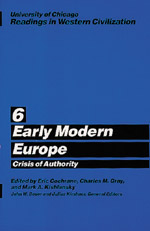 Civilization
and its contents
Civilization
and its contents
>>
Faculty revamps the Western Civ offering yet again.
When
Chicago undergrads received the 2002-03 class schedule this
spring, one change in the course offerings quickly made campus
news. History of Western Civilization will be joined this fall
by the new civilization studies sequence European Civilization,
modeled after the Ancient Mediterranean World sequence launched
two years ago. History of Western Civilization will continue
to be taught during the regular academic year and the summer
quarter, but fewer sections will be offered.
|
|
A familiar volume for Western Civ students
|
Introduced
in 1949 as a requirement in the College's general-education
curriculum, Western Civ is now one of 24 offerings that satisfy
the College's civilization studies requirement. (In fact, Western
Civ has not been a universal College requirement since 1966.)
For at least some alumni and students-including a dozen or so
who handed out flyers protesting the apparent decline of Western
Civilization at the April 12 dinner marking the launch of the
Chicago Initiative fund-raising campaign-Western Civ is a University
icon; its seminar-style discussion classes and close reading
of original historical documents and other primary sources are
synonymous with education in the College.
As
an April 9 Maroon editorial put it, "The Western
Civ program, perhaps more than any other currently offered class,
embodies the hallowed scholastic tradition of the classic Chicago
common education."
Responding
in the April 12 Maroon, Donald N. Levine, AB'50, AM'54,
PhD'57, the Peter B. Ritzma professor and former dean of the
College, took a different view: "As I understand it, what
most distinguishes the Chicago tradition of general education
has been not any particular course or curricular structure,
but a process of faculty inquiry into the currently defensible
aims of liberal education and the best available local means
of pursuing them."
Designed
by members of the history faculty over the past several years,
the new civilization studies sequences, like Western Civ, emphasize
seminar-style discussion and close reading of primary texts.
Each consists of a two-quarter course raising general issues
over a period of time (1,600 years in the case of European Civilization),
followed by an optional one-quarter "major problems"
seminar in which students will focus on an issue in depth and
write a major research paper. Seminar topics scheduled for European
Civilization this fall include the 18th-century Enlightenment
and the origins of the British Empire.
A
more complete course description, plus a history of the civilization
studies requirement in the College, can be found in a letter
written by the European Civilization staff (www.alumni.uchicago.edu/gateway/study-civ.html).
-M.R.Y.

![]()
 Civilization
and its contents
Civilization
and its contents